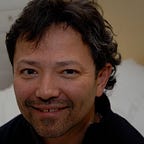Life and Death 4
Descent from the Magic Mountain.
We were discussing Thomas Mann’s The Magic Mountain.
The Quest
The transcendence of both Enlightenment humanism and Hegelian onto-theology is authority over experience.
It is an authority that cuts us off from life, separates us from life, and therefore leads only to death. But insofar as death is part of life, we must navigate and reveal these tendencies pulling us away from life, at all times wary of not falling into them.
The quest is to create a balance between passion and reason that affirms life; reason with its origins in passion and desire that overflows.
Apollo and Dionysus
In terms of Apollo and Dionysus, the classic and romantic, the word and music, Goethe and Wagner, Apollo has his source in Dionysus.
Apollo is the child floating in a raging Dionysian sea. But if Apollo cuts himself off from Dionysus, refuses to recognize that passion is the source of reason, irrationality is the source of rationality, the inorganic is the source of the organic, death is the source of life, then Apollo becomes death separated from life.
Apollo cut off from Dionysus can only regain life by healing.
Apollo must go through sickness to find health; must face a death of shattered beliefs in order to regain freedom.
Passion and Reason
All of life, which includes death, must be embraced in order to affirm life; not the love of death that leads to irrationality, not the love of reason cut off from life. But acceptance of life as aesthetic experience, and awareness of the risk of the romantic transmuting into terror, and reason transmuting into conformity.
For there to be a balance between passion and reason, we must remain aware of reason having its origins in passion.
Life is the passion of creativity, absorbed in the sensible; it is love overflowing. Death is the irrationality of destruction and terror; it is love repressed, authority over experience.
For us to experience true freedom, to truly be alive, love must rule, the love of homo natura, man in nature, immanent and in a field of pure creativity.
Life and Death
Life floats on a sea of death, just as ordered experience floats on a sea of delirium.
To overcome authoritarian duality and transcendence, to experience immanence, to find self-realization, fulfillment, we must carve our own path and steer clear of the extremities and deformations of thought transmuted.
Castorp rejects both the homo humanus of Settembrini and the homo dei of Naphta; both lead away from reality. Standing in the center of the world chart, he declares:
There is both rhyme and reason in what I say, I have made a dream poem of humanity. I will cling to it. I will be good. I will let death have no mastery over my thoughts. For therein lies goodness and love of humankind, and in nothing else. Death is a great power. One takes off one’s hat before him, and goes weavingly on tiptoe. He wears the stately ruff of the departed and we do him honour in solemn black. Reason stands simple before him, for reason is only virtue, while death is release, immensity, abandon, desire. Desire, says my dream. Lust, not love. Death and love — no, I cannot make a poem of them, they don’t go together. Love stands opposed to death. It is love, not reason, that is stronger than death. Only love, not reason, gives sweet thoughts. And from love and sweetness alone can form come: form and civilization, friendly, enlightened, beautiful human intercourse — always in silent recognition of the bloodsacrifice. Ah, yes, it is well and truly dreamed. I have taken stock. I will remember. I will keep faith with death in my heart, yet well remember that faith with death and the dead is evil, is hostile to humankind, so soon as we give it power over thought and action. For the sake of goodness and love, man shall let death have no sovereignty over his thoughts. — And with this — I awake. For I have dreamed it out to the end, I have come to my goal. (The Magic Mountain)
Love is Stronger than Death
Only love is stronger than death. What does this mean? How might we elaborate further?
Castorp embodies life as experiment. Life as experimental has its source in the sensual, but does not deny mind, nor endorse terror.
Death is repressed love, condemned to the netherworld, passion silenced by reason. Love is acceptance of passion and reason in check, passion as the fire of reason.
The dream poem of humanity, love is stronger than death, is an embracing of the flow of life becoming, and the dissolution of static duality.
Castorp adopts a Nietzschean perspective, standing between passion and reason, harnessing both in aid of the creation of the new. Not unbridled romanticism: the will to power is not the passion of destruction and death. It is to cultivate the desire to create life overflowing, and reason based in desire.
Sickness of Thought
At the time The Magic Mountain was written the world was sick; its ailment the failure to embrace love as the master over passion and reason, immanence over transcendence.
The world today is still in need of healing. We still suffer from the disease that creates a duality of beliefs and ideas. Reason unbounded destroys life, just as the mutation of passion, passion repressed, creates terror.
Only by embracing and affirming life, allowing one to overflow with a desire to love life, can we ever hope to survive.
I hope you enjoyed this article. Thanks for reading!
Tomas
Please join my email list here or email me at tomas@tomasbyrne.com.
Excerpt from my forthcoming book, Becoming: A Life of Pure Difference (Gilles Deleuze and the Philosophy of the New) Copyright © 2021 by Tomas Byrne. Learn more here.
